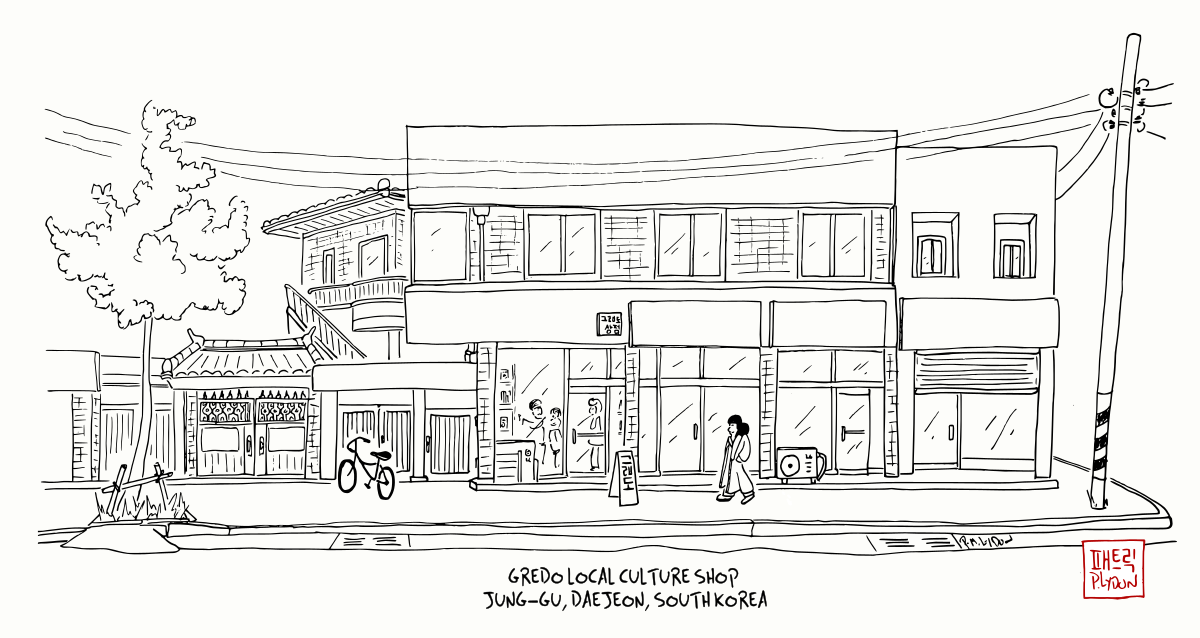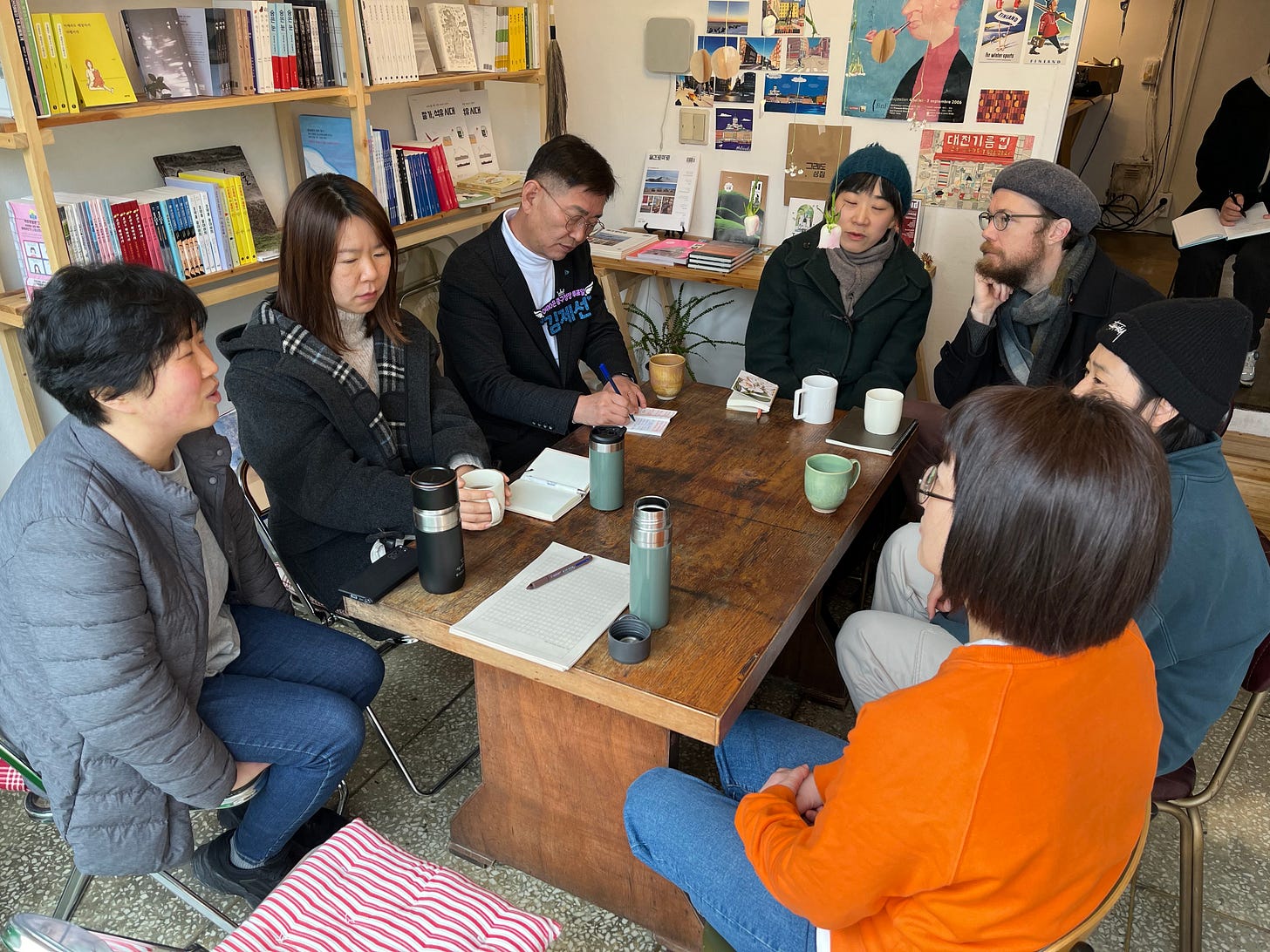SHORT #40: Bikes, Parks, Kids, and the Slow Tide of a Political Movement
A true story of a politician and his 'crazy' idea for making cities more livable
We find ourselves sitting in a cozy new bookshop in the heart an old neighborhood in Jung-gu, Daejeon. The smell of buckwheat tea drifts between bookshelves filled with newly-published books, some promoting local stories about the importance old places, some containing new ideas on urban lifestyles. Outside the window, a young tree works to find its roots.
A handful of us regular folks — people with a bone to pick and a dream to chase — sit around a table. We are here to meet with a mythical local figure named Kim Je-Seon.
This dude's been around the block. Back when I was still learning how to walk — and Korea was still finding its democracy legs — Kim was a young student, out there mouthing off against Korea’s military dictatorship. You probably can guess what happened to him next. He was kicked out of university, tortured by secret service agents, thrown in prison, the full treatment of a dictatorship. And you know what? He's still here, and he has been leading local and national movements for citizen solidarity, effective education, and a political system that offers more local autonomy ever since.
So our motley crew of moms, nature punks, and local activists sit with Kim, and we talk about all the stuff that keeps us up at night. Things like, why can't our kids play outside without getting hit by a car? Why do we gotta fight tooth and nail just to plant a damn garden? How can we get more nature in the city, and generally get this whole urban sprawl mess under control?
All of it is important. But then politician Kim drops the bombshell. It is about his dream. A dream of a car-free city.
Not believing my ears, I lean over and whisper to Suhee. “Did this politician really just say he dreams about a car free city?” Turns out Kim is not just blowing smoke. The dude has receipts. He starts talking of the benefits, and names other world-class cities that have already made the leap and never looked back.
After hearing this, I take my turn speak up. “You are not the only one.” I pause for what feels like a very long time, but it is likely just a moment. In that moment, all of the other concerns people had raised in the meeting whirr around in my mind. I see them, and how each one connects directly with Kim’s car-free dream. “Say.” I continue. “There are 8 or 12 lane roads running across the whole city. That is a huge amount of land. If it were re-arranged a bit, we could make enough space for a safe bicycle and pedestrian network, linear parks, nature corridors, gardens, playgrounds, little neighborhood libraries and hangouts for kids, moms, the elderly, and for other species. You know, all the things we have been talking about. It would bring the city together, bring us closer to each other and to nature.”
Then I throw down an illustration from The Possible City on the table.
The politician Kim smiles. He gives a big thumbs up, and seems to agree with the assessment — later he even calls and asks to share one of The Possible City drawings on his blog.
But there is a catch. There is always a catch. Presently, Kim looks around the room. He meets our gazes, observes the spaces, and then he breaks it down for us. “All of you here. You are the minority.”
Suddenly a military jet suddenly streaks across the sky outside, leaving a trail of thunder as often happens in Daejeon. We all stare back in silence at Kim. He elaborates, telling us that there are few people who care so much about the city. Even fewer make it a point to join together with each other, and do something about it. “But we need it.” Kim says that awareness is built, and change happens, only when people like us take actions.
Kim knows a lot about the importance of local actions. Though he was recently courted by the Democratic party to run for a National Assembly seat, he chose instead to run for local office. He tells us it is more important to focus on the neighborhood where he lives right now. As a result of such choices, Kim has an extraordinarily wide view for a local politician. “I talk to other politicians about a car free city and they think I am crazy.”
Is he crazy? Are all of us in this room crazy? Probably not, but ideas like this are not something you can build a political platform on, at least not at this moment in Korea.
So Kim's got big ideas, but he's also got big problems. Like, how do you sell a car-free city to a country that has relied on the trusty sedan since the first Hyundai Pony rolled off the assembly line? It's like trying to get your grandma to make TikTok videos when she is still fixated on her dial-up modem.
But Kim ain't crazy. He's just ahead of the curve. And us? You and me? Well, we're the lucky ones who in various ways, get to ride shotgun. On our bicycles. With our strollers. With our Chevro-Legs.
So, what did we learn from the meeting? We already know that change does not happen by sitting around and thinking about change. Sometimes you need to grab the handle bars, pop a wheelie, and get going down that forested urban bicycle path — maybe throwing down some seed bombs and tactical urbanism along the way.
But where to start? For that, we might take a page out of Kim's book. Dream big, but start with what you can do now, in the place where you are.
—
Thanks for reading everyone. I am extremely thankful that you all are here. If you know of others who might enjoy The Possible City, please take action to share it with them. If you are already doing that, the next best thing to help keep this ship sailing, is to join the secret club of paid subscribers. It is a great club, full of wonderful people. No matter what, thanks to all of you, for whatever actions you are taking in your own life and work.
Keep it up. See you next time.







